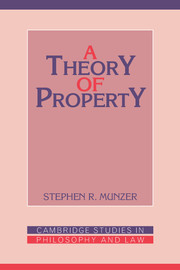Book contents
1 - Property, justification, and evaluation
Published online by Cambridge University Press: 05 June 2012
Summary
PROBLEMS OF JUSTIFICATION AND EVALUATION
Property is a well-known feature of our world. If asked to do so, many people could describe the property institutions of their own country, and some of them could even contrast their own institutions with those of foreign countries. In the United States, for example, many adults could explain that a great deal of land is owned by the federal government for national parks and military bases, that much land is held privately, and that private property of all sorts is not distributed equally. Well-informed persons, moreover, could explain that property institutions in the United States are more similar to those of the United Kingdom than they are to those of the Soviet Union or the People's Republic of China. They would be likely to guess that the distribution of property in “communist” countries is more equal than in the United States, though the standard of living is lower.
Yet many educated people would not stop at cool description or explanation, for they would recognize that property rights can incite passion and be the stuff of revolutions. Just as some people would extol the virtues of a modified capitalism that allows some to amass enormous wealth, even if others are poor, so other people would contend ardently for a more nearly equal distribution of wealth, even if they would resist prevailing forms of communism.
- Type
- Chapter
- Information
- A Theory of Property , pp. 1 - 12Publisher: Cambridge University PressPrint publication year: 1990



